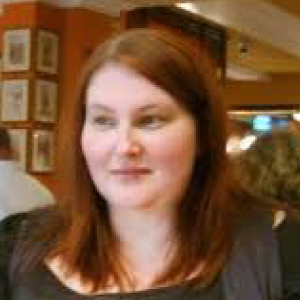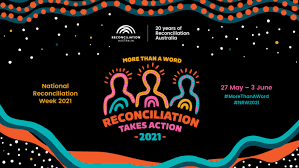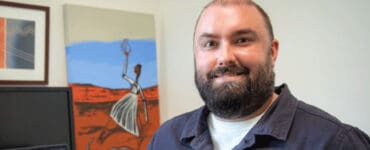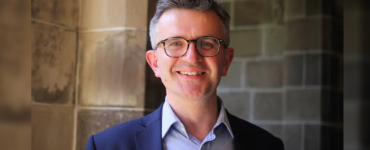What is National Reconciliation Week?
In 1993, most of Australia’s major faiths joined with Aboriginal and Torres Strait Islander peoples and a Week of Prayer for Reconciliation began. 1993 was the Year of the Indigenous Peoples so many Australians were already thinking about how they might learn more. In 1996 the Federal government initiative and appointed Council for Reconciliation (CAR) launched the first Australia wide National Reconciliation Week. The dates are significant. The week begins after National Sorry Day, on May 27th the date the referendum was passed in 1967 and ends on June 3rd the date the High Court Mabo decision was delivered and now celebrated as Mabo Day.
National Reconciliation Week (NRW) has a mixed response from Aboriginal and Torres Strait Islander peoples across the country. Many see it as an opportunity to educate non-Indigenous peoples and share some of their culture that is often denied to them. Others within community are exhausted by NRW because the burden is placed on Indigenous peoples to educate others about their culture but without thought to how this might happen outside of NRW. Many are tired of being asked to share only during NRW as if their culture, experiences, and gifts can only be available during one specific week.
It’s good to be aware that, like most events and occasions, there is a diversity of voices and experiences within Aboriginal and Torres Strait Islander experiences.
Reconciliation Australia’s theme for 2021, More than a word. Reconciliation takes action gives us the perfect opportunity for non-Indigenous people to take some time to do their own education – attending public events, checking out library resources, reading up on their local, national, or church history with Aboriginal & Torres Strait Islander peoples (or as my dad called it: the good, the bad, and the bloody).
You can find Reconciliation Week Events all over the country and may are listed here on the national events page: https://nrw.reconciliation.org.au/calendar but here are a few key events that speak to us as a university community:
Our Country, Our Future, Our Shared Responsibility
Online event May 27 @ 10:00 AM – 1:30 PM AEST
Aboriginal culture and history is the culture and history of all Australians. Help us celebrate National Reconciliation Week 2021 by tuning in to our free, online event – Our Country, Our Future, Our Responsibility. We have brought together some of the Country’s most inspiring visionaries including keynote speakers Aunty Judy Atkinson and Uncle Richard Frankland. Join former AFL star, Australian of the Year recipient, anti-racism advocate and straight-up legend, Adam Goodes for an In Conversation piece. The program will also feature a live smoking ceremony with Wurundjeri Elders and insight into Firestick Knowledge with Victor Steffensen and a panel Q&A. To top it all off, the event will be concluded with a show-stopping performance by one of our most beloved musicians, Archie Roach. Please be a part of #NRW2021 on May 27 from 10 am – 1.30pm.
https://yarraranges.sales.ticketsearch.com/sales/salesevent/10329
Reconciliation: An Issue White Australia Must Solve
Online May 27 @ 12:00 PM – 1:30 PM AEST
Join Professor Sarah Maddison, Shane Howard, and Sophie Trevitt
‘an issue only solvable through the action and motivation of non-First Nations Australians.’
Panellists will dissect the underlying barriers, including racism which permeates mainstream Australian society, and discuss the impact strong commitments including Reconciliation Action Plans can have in organisations. This conversation will also consider actions non-First Nations people can take in their daily lives to create a different future for First Nations people
Online https://fb.me/e/1kEbW4BWM
Distinguished Professor Aileen Moreton-Robinson will be presenting the 2021 Swinburne Annual Reconciliation Lecture
Online event Mon, 7 Jun 2021 5:00 PM – 6:15 PM AEST.
Race, Reconciliation, and Indigenous Sovereignty
“Reconciliation action plans abound in the public and private sectors, an outcome of the reconciliation movement. Reconciliation is perceived as a moral compass to deliver outcomes for Aboriginal people. It is an initiative of the state and many would argue a decolonising strategy. In this lecture I consider how racial logics enable reconciliation to become an Aboriginal possession, one that operates to obscure the existence of our sovereignties for the benefit of nation.”
Black Lives Matter and its implications for our Australian context
Online Sunday May 30th 3pm -4.15ish AEST
To mark the anniversary of George Floyd’s death, we continue our conversation about Aboriginal incarceration rates and deaths in custody with special panellist Revd. Aunty Dianne Langham, who is Aboriginal Elder, an Anglican priest, and a Chaplain with the NSW Correctional services leading the conversation.
Given that NRW begins on May 27th we will also give some attention to the issue of Treaty whish is restarted in the 2017 Statement of the Heart and the Revd. Dr Garry Deverell will lead us in the discussion. Panellists: Revd. Aunty Dianne Langham; Revd. Dr Garry Deverell; Emma Jackson; Revd. Liam Miller, Revd. Tau’alofa Anga’aelangi and Rev Dr Katalina Tahaafe- Williams
https://us02web.zoom.us/webinar/register/WN_632S_sd_Qr-2SDK5WHzVcg

Naomi Wolfe is a trawloolway woman, and First Peoples Coordinator at the University of Divinity. Naomi encourages a collaborative learning between Aboriginal and non-Aboriginal staff and students at the University to break down barriers destroy stereotypes and to cultivate new relationships based on respect. She has a professional and personal interest in Indigenous cross-cultural training and awareness as well as Indigenous pedagogies and theology.







Add comment